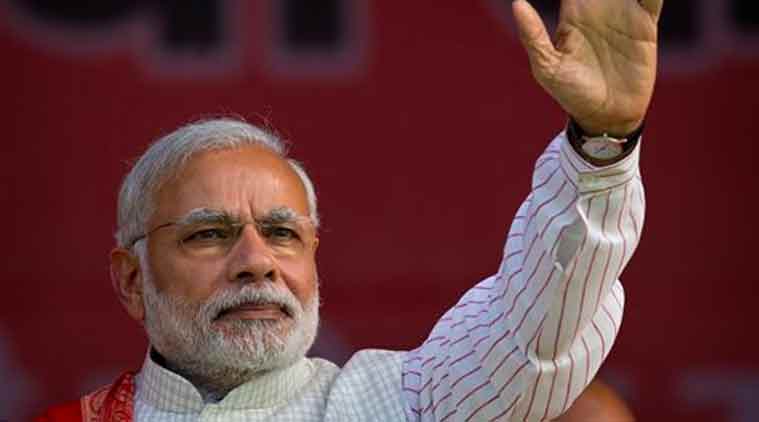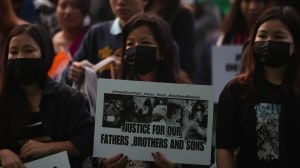- India
- International
Border in the middle
Beijing’s reaction to Modi’s Arunachal Pradesh visit was unusually strong.
 Chinese sources have been claiming that during Xi Jinping’s visit to India in September last year, he and Modi had reached an understanding on how to settle the border issue.
Chinese sources have been claiming that during Xi Jinping’s visit to India in September last year, he and Modi had reached an understanding on how to settle the border issue.
In the past, especially during the decade of 2004-14, whenever then Prime Minister Manmohan Singh visited the northeastern state of Arunachal Pradesh, China did object but, having done so, let the matter rest. This time around, however, after Prime Minister Narendra Modi’s visit to Itanagar, Beijing has reacted unusually strongly. It has said that the visit “went against attempts by both countries to resolve the border dispute peacefully and quickly”. The official spokesman of the Chinese foreign office, Hua Chunying, added that the Chinese government has “never recognised ‘the so-called Arunachal Pradesh’ and it is therefore opposed to such visits”. Beijing, he went on, had “lodged a strong representation” with New Delhi to express emphatic opposition to the Indian prime minister’s “visit to a disputed zone along the China-India borders”. The spokesman also claimed that Arunachal Pradesh was “established largely on three areas of Tibet under India’s illegal occupation… These areas have always been Chinese territory”.
This was only the beginning. The next day, for the first time in similar circumstances, India’s ambassador to China, Ashok Kantha, was summoned to the foreign ministry, where both the tone of the protest and the rank of the protestor were raised. The ambassador was received by Vice Foreign Minister Liu Zhenmin, who told him that not only had the Indian side’s act “undermined China’s sovereignty, rights and interests” but also that the prime minister’s journey had “artificially amplified differences between the two countries on the border issue and thus gone against principles and consensus that the two sides had reached on properly addressing this issue”. The Chinese vice foreign minister then expressed “strong dissatisfaction with and staunch objection to” the Indian side’s insistence on arranging visits by its leader to “disputed areas along China-India border”. For quite some time, Chinese sources have been claiming that during President Xi Jinping’s visit to India in September last year, he and Modi had reached an understanding on how to settle the border issue “peacefully and speedily”.
It can be argued that if China did not mind marring Xi’s visit to India with a simultaneous military stand-off on the Indian side of the Line of Actual Control (LAC), it could also, for its own reasons, create a pointless ruckus of great magnitude over a trivial matter. But there are several reasons why what has happened seems surprising. In the first place, both sides are preparing for Modi’s state visit to Beijing in May. National Security Advisor Ajit Doval has been shuttling between the two capitals for this purpose. Second, External Affairs Minister Sushma Swaraj’s meeting with Xi in Beijing was cordial and constructive, and it took place only the other day. Since the special representatives of the two countries for border negotiations — Doval and Yang Jiechi — are due to meet in the Chinese capital this month, the question arises whether China has decided to take a tough line on the subject.
The strangest element in the situation is that though Beijing had watched US President Barack Obama’s second visit to India as chief guest on Republic Day with a hawk’s eye, its comments on an event of such significance were rather mild in comparison to its angry statements on Modi’s brief visit to a part of his own country. Indeed, after a few critical remarks initially, the Chinese, through elaborate commentaries by the official news agency, Xinhua, and articles in the Global Times, published together with the People’s Daily, described the visit as “symbolic rather than pragmatist”. They also said that three days were not enough to develop the bonhomie that was supposed to have been created. The commentaries added that Obama needed the India visit to “bolster his own position in his own country, especially in relation to the US Congress”. They also emphasised that there were “serious differences between India and the US over climate change and agriculture”, and only a year earlier American diplomats in Delhi had been sent back because of the way the US treated an Indian woman diplomat in New York. Although Beijing has often blamed the US for trying to use India as a counterweight to China, one Xinhua commentary declared that India and China “must not fall into the trap of rivalry being laid by the West”.
On the other hand, during the three days Obama was in Delhi, Pakistan’s army chief, General Raheel Sharif, was in Beijing. Not only was he given a very warm welcome, but Pakistan was also highly praised. It has so far been called China’s “all-weather friend”. Now the description has been elevated to “irreplaceable all-weather friend”. The Pakistanis, who will be welcoming Xi soon, are overjoyed.
The writer is a Delhi-based political commentator.
express@expressindia.com
EXPRESS OPINION
More Explained
Apr 25: Latest News
- 01
- 02
- 03
- 04
- 05











































